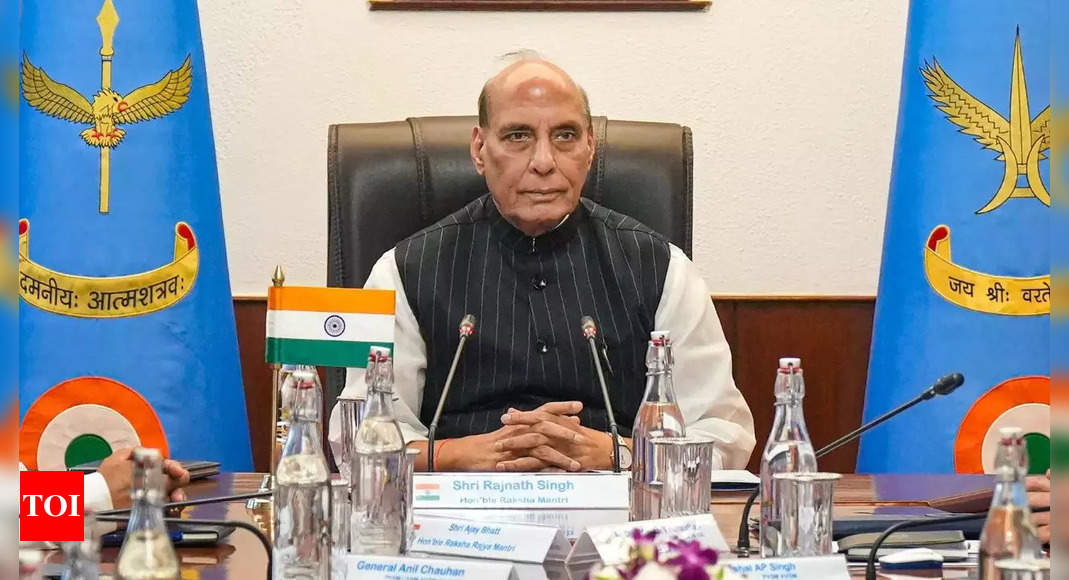The approach of ‘might is right’ has no place in the maritime order, according to Defence Minister Rajnath Singh. He stressed the need for fair and cooperative rules of engagement, emphasizing that no single country should dominate others. Singh’s remarks were seen as an oblique reference to China’s aggressive muscle-flexing in the Indo-Pacific region. Speaking at the Goa Maritime conclave, Singh warned against flouting or disregarding established international law, stating that such actions would lead to the breakdown of civilised maritime relations. He underscored the importance of adhering to international laws and agreements, particularly the United Nations Convention on the Law of the Sea (UNCLOS) 1982.
Singh highlighted that a free, open, and rule-based maritime order is a priority for all countries involved. He warned against allowing narrow immediate interests to tempt nations into disregarding international law, as doing so could undermine civilized maritime relations. Singh called for cooperative commitment to adhering to legitimate maritime rules of engagement in order to preserve common security and prosperity. He stated that fair rules of engagement are crucial for fostering collaboration and preventing any single country from dominating others in a hegemonic manner.
The defence minister discussed the challenges faced in the Indian Ocean region as well as the Indo-Pacific, emphasizing the importance of respecting international maritime laws outlined in the UNCLOS 1982. Singh’s address was attended by representatives from 12 countries.
Singh also called for the establishment of multinational collaborative mitigation frameworks in the Indian Ocean region to effectively address common maritime challenges such as climate change, piracy, terrorism, drug trafficking, illegal fishing, and freedom of commerce in high seas. He suggested that collaborative efforts could involve countries working together to reduce carbon emissions and transition to sustainable practices. Singh highlighted the need for all countries to accept responsibility for cutting emissions by investing in a green economy and sharing technology and capital with needy countries.
The defence minister also referred to ‘Illegal, Unreported and Unregulated’ (IUU) fishing as a challenge related to resource over-exploitation. He emphasized that IUU fishing endangers ocean ecosystems, sustainable fisheries, and economic security. Several countries in the region have concerns about China’s illegal fishing in the Indian Ocean region. Singh stressed the need for a multinational collaborative effort to compile and share surveillance data to identify actors with irregular or threatening behavior.
To establish these mitigation frameworks, Singh highlighted the importance of collaboration and sharing of resources and expertise among nations. He discussed the difference between narrow national self-interest and mutual benefit based on the enlightened self-interest of all nations. Singh emphasized that while optimal outcomes often involve cooperation and building trust among nations, fear of being taken advantage of or acting alone in a hostile world can lead to suboptimal decisions. He called for solutions that promote cooperation, build trust, and mitigate risks. Singh suggested building trust through dialogues, joint exercises, industrial collaboration, sharing of resources, and respecting international law.
The Goa Maritime conclave, attended by representatives from Comoros, Bangladesh, Indonesia, Madagascar, Malaysia, Maldives, Mauritius, Myanmar, Seychelles, Singapore, Sri Lanka, and Thailand, provides an opportunity to develop effective mitigation strategies against changing threats in the Indian Ocean region. Chief of the Naval Staff Admiral R Hari Kumar emphasized the importance of maintaining peace and securing growth in the Indian Ocean Region.
After his address, Singh visited the ‘Make in India’ stalls at the venue, showcasing India’s indigenous manufacturing capabilities in the defense industry.











